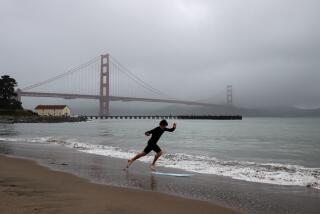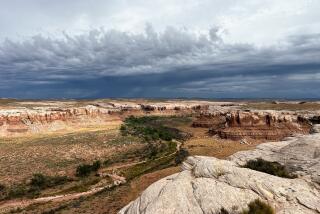Justices Take Up State Control of Big Sur Mining
WASHINGTON — The Supreme Court, entering a wide-reaching environmental dispute involving the scenic Big Sur coast, agreed Monday to consider whether California and other states may regulate federally approved mining operations on national forest lands.
The justices said that, in the term beginning next October, they would review a ruling by a federal court of appeals in San Francisco saying state permit requirements for such operations were preempted by federal regulations.
Limestone Mining
The decision, issued last August, was a sharp defeat for the California Coastal Commission. The ruling allowed the Granite Rock Co. of Watsonville to continue a major limestone mining project at Mt. Pio Blanco without state approval.
Eight other Western states--Alaska, Arizona, Hawaii, Montana, New Mexico, Oregon, Utah and Wyoming--backed an appeal of the ruling by California Atty. Gen. John K. Van de Kamp (California vs. Granite Rock, 85-1200). They said that the ruling, if upheld, could affect 140 million acres of federal land--much of it in the West--and cast doubt on numerous state environmental rules now applied to such areas.
Pio Blanco is a prominent landmark just inside the Los Padres National Forest, its white limestone peak visible from heavily traveled state Highway 1. Nearly 3 million tourists visit the Big Sur coast each year. The state, quoting the late photographer-environmentalist Ansel Adams, called the area one “of unparalleled natural beauty.”
The Granite Rock mining project is regarded as one of the highest-grade limestone operations in the country. Limestone is used in products ranging from concrete to toothpaste whitener.
The company began mining the area in 1981, obtaining approval under an 1872 federal law. Federal regulations require mining companies to comply with federal and state environmental standards for air and water quality, solid waste, scenic values and fish and wildlife habitat.
Bulldozing and Blasting
The state, noting that mining necessitates bulldozing, blasting and excavating, sought to require a state permit for the company to ensure that its operations were carried out in an “environmentally sensitive and resource-protective fashion.” The Forest Service has only limited resources to supervise mining operations, and supplemental state regulation would mean better environmental protection, the state said.
The company challenged the state permit requirement in federal court. A federal District Court ruled against the company, but the U.S. 9th Circuit Court of Appeals reversed the decision. Circuit Judge J. Clifford Wallace, writing for a unanimous three-member panel, declared: “An independent state permit system to enforce state environmental standards would undermine the Forest Service’s own permit authority and thus is preempted.”
In other action, the justices:
--Refused to hear a challenge by Los Angeles authorities to a state Supreme Court decision saying that a criminal suspect accused of a misdemeanor must be arrested within a year after charges are filed--or the case may be thrown out on the grounds that such delay violated the right to a speedy trial. (California vs. Serna, 85-1365).
The California court held 5 to 2 last October that, after one year--the statute of limitations for most misdemeanor offenses--the state must prove that the delay had not been prejudicial to the defendant.
Issue of Contraband
--Agreed to decide whether contraband abandoned by a suspect who fled after seeing police officers may be used as evidence against him in court. The Michigan Supreme Court held that a pistol allegedly dropped on the street by a Detroit man was inadmissible because the mere fact that he ran after seeing the policemen was not sufficient indication of criminal activity. Thus, because police pursuit of the suspect was not justified at its inception, the resulting evidence was inadmissible, the court said. (Michigan vs. Shabaz, 85-1265).
Detroit police officers, who were wearing civilian clothing and driving an unmarked car, said they had seen the suspect look in their direction and then stuff a paper bag into his vest. They slowed down, and he began running, throwing the bag into a doorway before he was finally captured, they said. Police officers found a revolver in the bag and arrested the suspect for carrying a concealed weapon.
More to Read
Sign up for Essential California
The most important California stories and recommendations in your inbox every morning.
You may occasionally receive promotional content from the Los Angeles Times.










